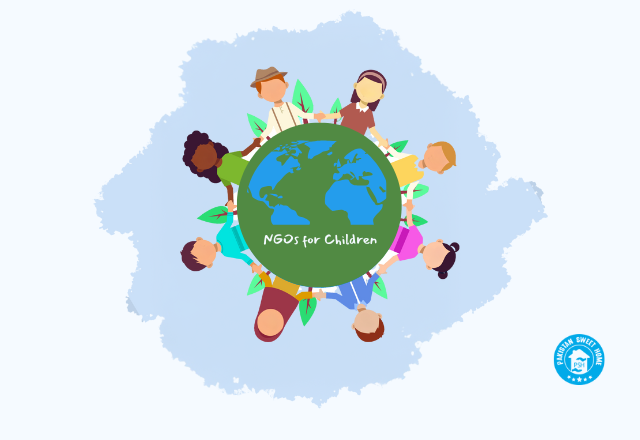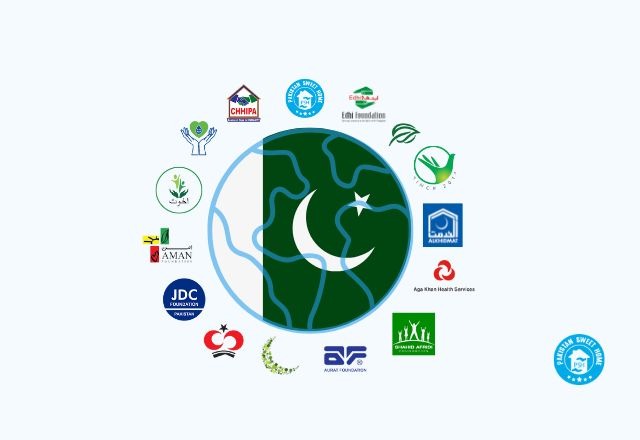Non-Governmental Organizations (NGOs) are the silent force behind much of the world’s social progress.
From educating underserved communities to responding to disasters or protecting the environment, their impact is far-reaching. In Pakistan and beyond, NGOs take many forms, each serving a unique purpose.
But what exactly are the different types of NGOs, and how do they operate?
Whether you're a donor, sponsor, volunteer, or someone curious about how meaningful change happens in society, understanding NGOs is a great place to start. Learning about the different types can help you connect with causes that align with your values.
Let’s explore the major categories of NGOs and discover how these organizations are making an impact locally and globally.
NGOs Based on Orientation
Following are the NGO categories based on orientations:
1. Charity
Charity is a type of NGO that addresses the needs of the underprivileged by providing essentials like food, shelter, and clothing. It also offers education and healthcare services. In times of natural disasters, it is on the ground offering support and relief.
A prominent charity example is Pakistan Sweet Home. It was established in 2009 after a devastating flood that destroyed countless homes and left many children orphaned.
The largest orphanage NGO in Asia has played a critical role in offering a safe and nurturing environment for these children. It provides them with shelter, food, education, clothing, and healthcare—everything they need to grow and thrive in a challenging time.
Charitable organizations often depend on fundraising events, donations, and volunteer support to achieve their goals. They tackle social and humanitarian issues by providing help, assistance, and resources to those who need it. Their work has a significant social impact by improving lives and building stronger communities.
2. Service
Service-oriented NGOs are groups that focus on promoting family planning, healthcare, and education. They organize these efforts into specific programs and encourage people to get actively involved to make sure everything runs smoothly. These NGOs get their funding from either private donations or government support.
3. Participation
These NGOs are like self-help projects with a participatory focus involving local people in getting things done. This might mean they contribute money, work, materials, or other resources.
Participation starts when a project is just an idea and continues through planning and carrying out the tasks in a community development project. This approach is typical in cooperatives.
4. Empowerment
Empowerment-oriented NGOs focus on helping people in need understand the power they have to change their lives for the better. They work to increase awareness about the political, economic, and social factors that impact them.
These NGOs can start organically around a specific issue or be set up with the guidance of outside experts.
5. Research
Research-oriented NGOs are like centers for knowledge. They collect data and conduct thorough analyses on various topics. This information is essential because it often lays the groundwork for the actions taken by service-based and advocacy NGOs.
A research NGO might publish a report on the long-term effects of natural disasters on public health. This information can help service-based NGOs develop more effective relief strategies.
Their role isn't just about academic studies; they work closely with other NGOs to help them make better decisions and plan smarter strategies.
NGOs Based on Level of Operation
Following are some NGO types based on the level of operation:
1. City-Wide Organizations
City-wide NGOs are groups that focus on helping people within a specific city.
These can be unions of businesses, community organizations, chambers of commerce, and industry, or groups based on ethnicity or education. People create these NGOs to help those in need, especially the poor. Many of these organizations make it their main goal to offer support and assistance to those who need it the most.
2. National NGOs
National NGOs are organizations that operate throughout an entire country. Some national NGOs support local NGOs and have branches in various states or regions. The Edhi Foundation and JDC (Jafriya Disaster Management Cell) are examples of such NGOs.
3. International NGOs
International NGOs (INGOs) include a range of activities like funding smaller regional NGOs, institutions, and projects. They often take charge of these initiatives themselves, ensuring the work gets done.
Examples of international NGOs are Save the Children, CARE, and OXFAM.
4: Community-Based Organization
Community organization involves uniting people to tackle challenging social issues. This can take the form of community work, projects, development, or community building. It encompasses organizing voluntary associations, social networks, and community-based initiatives.
Examples of these could be sports clubs, women’s groups, or educational organizations. The driving force behind community organization is a sense of togetherness, aiming to foster growth and development.
These organizations are typically governed by an elected body chosen by their members.
- Operational NGO: These NGOs specialize in planning and executing development projects
- Advocacy NGO: These NGOs work to defend or promote a specific cause, aiming to influence public policy.
NGOs Based on Organizational Structures
The following are NGOs categorized by their organizational structures:
- Civil Society NGOs aim to represent and serve the interests of the broader community, fostering civic engagement and promoting social welfare.
- Professional NGOs bring together individuals from specific professions to advance their collective interests, focusing on career development and industry standards.
- Business Organized NGOs are centered around promoting business interests. They work to encourage corporate social responsibility or support business-related causes.
- Government-organized NGOs are set up by government bodies but operate with a level of autonomy. They usually pursue specific social goals or support public services.
- Voluntary NGOs rely heavily on volunteers and focus on charitable activities, community service, or grassroots initiatives.
- Environmental NGOs work to protect the environment and advocate for sustainability, conservation, and ecological awareness.
Other Types of NGO
Following are some other lists of NGOs:
BINGO (Big International NGO): These are large, international organizations that work across countries and continents, often focusing on humanitarian aid, health, or development. An example is the Red Cross, known for its extensive global humanitarian work.
CITS (NGO supporting the scientific community): This type of NGO aims to promote science and technology by inspiring young talent to engage in research and development. The purpose is to foster innovation and contribute to scientific advancement.
An example of a CITS (NGO supporting the scientific community) could be The Wellcome Trust, a global charitable foundation dedicated to advancing science and health.
ENGO (Environmental NGO): ENGOs focus on environmental conservation and sustainability. They might work on issues like climate change, wildlife protection, or environmental education. Greenpeace is a well-known example that campaigns against environmental damage.
GONGO (Government-Operated NGO): These NGOs are operated or heavily influenced by government agencies. While they may carry out public service work, they often follow government agendas. The National Endowment for Democracy (NED) is an example of a GONGO.
INGO (International NGO): These NGOs operate on an international scale but are typically not as large as BINGOs. They may focus on global issues like human rights or poverty alleviation. Amnesty International is a classic example, known for its human rights advocacy worldwide.
QUANGO (Quasi-Autonomous NGO): QUANGOs are semi-independent NGOs that are sometimes funded or controlled by the government but operate with a certain level of autonomy. They often manage public services or regulatory functions. The International Standards Organization (ISO) is an example of a QUANGO (Quasi-Autonomous NGO).
RINGO (Religious International NGO): RINGOs are religiously affiliated NGOs with an international reach. They often provide aid and support while promoting their religious beliefs. World Vision, a Christian humanitarian organization, is an example of RINGO.
MANGO (Market Advocacy Organization): These NGOs focus on advocating for market-related issues, such as fair trade, ethical business practices, or consumer rights. Fair Trade International is a MANGO that promotes ethical trading practices.
CSO (Civil Society Organization): CSOs are community-based NGOs that work within local contexts to address social issues, promote human rights, or foster community development. An example is the Agha Khan Development Network is one such type of NGO in Pakistan that supports community-based projects.
CHARDS (Community Health and Rural Development Society): CHARDS are NGOs focused on providing healthcare and promoting rural development. For example, BRAC works to improve the health and well-being of rural communities, often addressing healthcare disparities and promoting local growth.
In conclusion, there are different types of NGOs, each serving a unique purpose and addressing various issues. Understanding the types of NGOs can guide you to those that align with your interests, whether you want to get involved, support them, or simply learn more about their work.
From grassroots organizations to international groups, each type of NGO plays a crucial role in tackling social, environmental, and humanitarian challenges. By exploring this diverse landscape, you may find inspiration to contribute to causes that resonate with your aim and make a meaningful difference in the world.
Orphanage donation is more than financial aid—it is an investment in a child's future. At Pakistan Sweet Home, donations are transparently utilized to fund school supplies, nutritious meals, medical checkups, and extracurricular activities. Such support gives orphaned children the tools they need to overcome challenges and reach their full potential.
Support a Hopeful Future for Orphans

info@pakistansweethome.org.pk
(051) 4865856
+92 335 1118477







